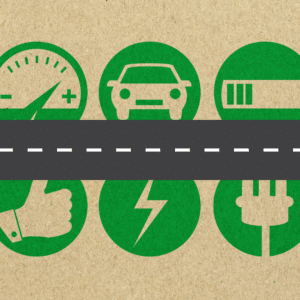Canada Electric Vehicles Facts
Gas is inefficient: Public transportation is also a vital way we can lower emissions because it means using less materials, and when it comes to all transportation we need to shift to a circular economy, where materials are reused and recycled as much as possible – rather than extracted. But the reason oil and gas interests don’t want Canada to build our own Electric Vehicles (EVs), based on localized supply chains, is because EVs are way more efficient than gas vehicles.
Even when powered by electricity from fossil fuels electric vehicles are still greener – and when powered by renewables they greatly reduce emissions. Canada can go 100% renewable and renewables create more jobs and offer cheaper energy than oil and gas.
Further according to fact checking by The Guardian:
- “the majority of battery materials used in cars are likely to be recycled… data suggests that after recycling, battery material waste over an electric car’s life will be about the size of a football, or 30kg, by 2030.”
- Julia Poliscanova, T&E’s senior director for vehicles and e-mobility, said: “By 2030 we will need around 30m tonnes of critical minerals [for batteries]. It’s very, very substantial, but if we put this in comparison, we used in one year 15bn tonnes of fossil fuels.” For fossil fuels “the sheer amount of material we need to get out of the ground is bigger and everlasting,” Hoekstra said. “At least with batteries you have a chance of making it circular.”
- “All the data shows that EVs are just much, much less likely to set on fire than their petrol equivalent,” said Colin Walker, the head of transport at the Energy and Climate Intelligence Unit thinktank. “The many, many fires that you have for petrol or diesel cars just aren’t reported.”
- In Norway, which has the world’s highest proportion of electric car sales, there are between four and five times more fires in petrol and diesel cars.”
Switching to electric vehicles in Northern Canada is also entirely achievable.
Should we prioritise public transit where possible? Certainly! But a lot of the attacks you’ll see on electric vehicles are really about keeping people using oil and gas for as long as possible. EVs aren’t without impact, but sources advocating for gas vehicles instead clearly don’t care about the environment. Continued – enforced – reliance on oil and gas sets in motion wildfires, floods, heat, and severe storms that put the most vulnerable at risk. Climate change is already claiming lives, filling skies with smoke that harms our health, and devastating whole communities.
Air pollution from fossil fuels kills 5 million people each year globally. Oil and gas corporations, and their friends in the U.S. Administration, have been lying to the public about climate change. Severe storms like Hurricane Fiona, and wildfires like the Jasper wildfire and those in NL have been made many times more likely and more severe because of climate change.
Help take action to stop the spread of this disinformation in Canada by talking to others and sign our pledge to help Canada go renewable.
- Related from Clean Energy Canada on the Electric Vehicle Mandate or EV Mandate: What is the Electric Vehicle Availability Standard and why does Canada need one?
- Related from the Pembina Institute on the ZEV Mandate: Electric vehicle sales mandate critical to lowering emissions from transportation.

